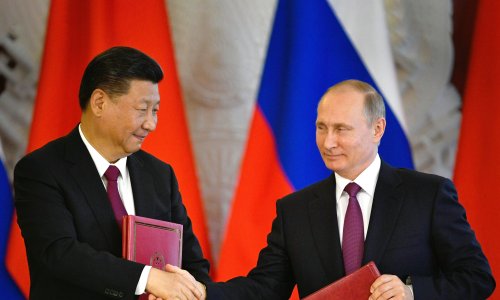Author: Guihai Guan
Affiliation: School of International Studies, Peking University, Beijing-China
Organization/Publisher: China International Strategy Review
Date/Place: May 13, 2022/ China
Type of Literature: Journal Article
Number of Pages: 18
Link: https://doi.org/10.1007/s42533-022-00101-6
Keywords: China, Russia, Bilateral Relations, Strategic Coordination, the Big Triangle
Brief:
The China-Russia bilateral relationship has seen its best days in the history of both countries, despite past conflicts. After the Cold War, the relationship transformed smoothly into a partnership. This study aims to analyze the development of the China-Russia relationship and examine its achievements, characteristics, and prospects. To do so, the author will examine the strategic relationship between the two countries over the past 30 years, including during the disintegration of the Soviet Union and the end of the Cold War. Despite several factors that could have negatively impacted the bilateral relationship, both countries have managed to maintain a good relationship and have found middle ground when facing crises. The author believes that productive cooperation and mutual support will not change despite changes in the international relations and regional environment.
The article is divided into three parts. In the first part, the author examines the historical development of the China-Russia bilateral relationship. In the second part, the author analyzes the unique factors that support the China-Russia strategic relationship. In the third part, the author discusses the challenges that China and Russia face in improving the relationship.
After the collapse of the Soviet Union, Russian President Boris Yeltsin appeared to move his country’s foreign policy closer to the West. This development was a concern for the Chinese leadership, but Beijing did not directly criticize Yeltsin’s policy. Instead, the Chinese leadership recognized the Russian Federation as the successor to the Soviet Union and signed an intergovernmental meeting minutes in December 1991 that transformed Sino-Soviet relations into China-Russia relations. One of the first significant treaties between the two countries was the “Joint Statement on the Basis of Mutual Relations between the People’s Republic of China and the Russian Federation,” which stated that both countries regarded each other “as a friendly country.” From then on, the relationship between the two countries made significant progress in various fields, including strategic and security, energy and oil trade, and cultural exchange.
The leadership changes in both countries in 2012 marked a new era in the China-Russia relationship. With Vladimir Putin returning to power for a third term and Xi Jinping being elected by the Chinese Communist Party, the two leaders have maintained a productive relationship that has secured many important treaties and agreements in various fields, including trade, energy, culture, and health issues during the COVID-19 pandemic. Soon after being elected as the new PRC leader, Xi paid a visit to Russia to emphasize the importance of their relationship. He stated that the China-Russia relationship serves the interests of both countries and helps to maintain international strategic balance.
Over the past 30 years, the China-Russia strategic relationship has seen significant improvement, and the author argues that there are five factors that have contributed to this achievement in maintaining bilateral relations. Firstly, both countries share similar ideas on governance models, including the non-interference principle and respect for diversity of civilization in internal affairs, as well as a rejection of models and discourses imposed by external actors. Secondly, there is a strong personal relationship between the two heads of state, with Putin and Xi framing their relationship as a sincere friendship and sharing common interests. Thirdly, China-Russia strategic cooperation has contributed to the promotion of global strategic security and stability, and as permanent members of the United Nations Security Council, China and Russia have played a role in balancing the power within the institution. Both countries also reject foreign intervention to promote Western-style democracy, which they view as a catalyst for unrest in the world, and instead seek to promote their own unique charm of their civilizations based on mutual understanding and trust through intergovernmental institutions. Fourthly, economic cooperation between the two countries has contributed to the healthy development of the world economy. Finally, China is the only major power to support Russia’s status as a major power and global influence, especially as the two countries are seen as global competitors by the US.
Despite the factors that have helped China and Russia strengthen their relations, the author recognizes that there are several challenges that need to be addressed if both countries want to upgrade their relationship. Firstly, there is a lack of scale and structure supporting the mode of economic and trade between China and Russia, despite their long shared border. The integration of infrastructure is still inadequate. Secondly, the quality of cultural cooperation lags behind in terms of education, as China and Russia have different educational systems, which has affected cooperation in science, technology, and innovation. Thirdly, third-party actors, particularly the US as the main competitor in global competition, have a significant impact on disturbing the relationship. Additionally, during global competition between the US and China, Russia has sometimes chosen to act as a spectator rather than supporting its strategic partner. Fourthly, there have been nonconstructive opinions in both countries at times, such as negative opinions towards China in Russia in response to the pandemic outbreak and antagonistic opinions towards Russia in China for making deals with the US to contain China. Finally, Russia’s strategic plans can be ambiguous at times, which may affect China’s strategic coordination, such as Russia’s intentions for regional integration in the Eurasian region.
Despite the challenges, the author believes that the China-Russia relationship has become more mature after overcoming various obstacles in the process of strengthening bilateral ties. Therefore, the author argues that the unique value of the China-Russia strategic relationship will not change, even after several crises in the 21st century, such as the pandemic, US-China global competition, and the war in Ukraine.
By: Salman Nugraha, CIGA Research Intern




